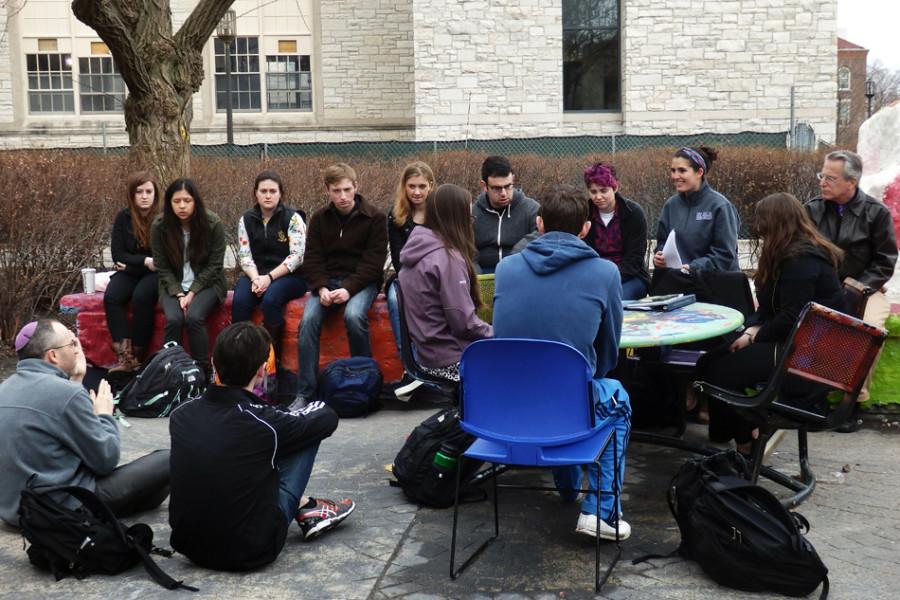Northwestern community commemorates Holocaust Remembrance Day
Lauren Duquette/The Daily Northwestern
Students commemorate Holocaust victims at The Rock during this year’s Holocaust Remembrance Day. SESP Prof. Danny Cohen closed the day’s events with the presentation of his book “Train,” which narrates the stories of different groups marginalized by Nazis.
April 17, 2015
Northwestern community members commemorated Holocaust Remembrance Day with three different events Thursday afternoon, closing the day with the presentation of SESP Prof. Danny M. Cohen’s new book “Train,” which follows six teenagers of different backgrounds during the Holocaust.
This year was the first time members of the NU community decided to pay homage to Holocaust victims by reading their names and stories out loud in a ceremony held at The Rock, said Medill junior Elyse Samuels, who helped organize the event. The ceremony was followed by the traditional “We Walk To Remember” march hosted by Alpha Epsilon Pi.
“One thing that we can’t really do is understand the magnitude of the Holocaust, both the number of Jews and non-Jews that were murdered, and I think that reading the names and stories was a start to that because it’s recognizing individuals and individual stories,” said Weinberg junior Jeff Budweg, who helped organize the day’s events.
Following the march, Cohen read a section of “Train” to an audience of about 70 students and community members at Annenberg Hall. He was joined by Weinberg Prof. Phyllis Lassner. Together they discussed the experiences, narratives and representations of other groups also victimized during the Holocaust.
Homosexuals, Roma and people with disabilities were also targets of the Nazis during World War II, but these groups are sometimes missing or misrepresented in Holocaust history, Cohen said.
Cohen recalled that during the first International Holocaust Remembrance Day, celebrated in Poland in 2005, members of the LGBT community weren’t allowed to participate in the commemorative ceremonies, even though LGBT people had also been targeted by Nazis. That experience made him realize that he didn’t know much about the perspective of other groups victimized by the Holocaust.
“I’m Jewish. I grew up Jewish. I was trained as a Jewish educator and so my understanding of Holocaust history was pretty good,” he said. “But I’m also gay, and I realized at this moment that I didn’t have a very good understanding … of the Nazi persecution of homosexuals. And I came to ask the question, why is it that I don’t know this part of history? And, why is it that Polish authorities so easily can exclude this whole group in 2005?”
This inspired him to study the experiences and histories of other targeted groups of the Holocaust.
As an educator, Cohen produced materials to teach Holocaust history in museums, classrooms and other learning places. When asked to present materials to represent marginalized communities, Cohen said he had a hard time finding books and stories that encapsulated all the different groups and decided to write his own fictional short stories that would tell these stories. “Train” was created almost by accident out of these stories, he said.
The novel tells the story of six teenagers from different backgrounds whose lives intersect on Feb. 27, 1943, when a Nazi raid captured Roma, disabled people, members of the LGBT community and Jews in Berlin and deported them to Auschwitz.
“These (characters) are not just witnesses to each other, they are also individuals that tie these narratives together,” he said. “There are some scholars who argue that the Jewish narrative should be separate from these other narratives … that position is problematized when we look at individuals who were persecuted for multiple reasons and when we look at separate individuals who were murdered in exactly same place … who share the same graves.”
Samuels said that she hoped the audience would follow Cohen and Lassner’s advice of honoring the victims’ memories by keeping them relevant and accessible and by not forgetting them.
“Continue on this memory, whether it’s one new story that you know or the entire event, but continue onward with learning more and commemorating the 11 million,” she said.
Email: marianaalfaro2018@u.northwestern.edu
Twitter: @marianaa_alfaro



